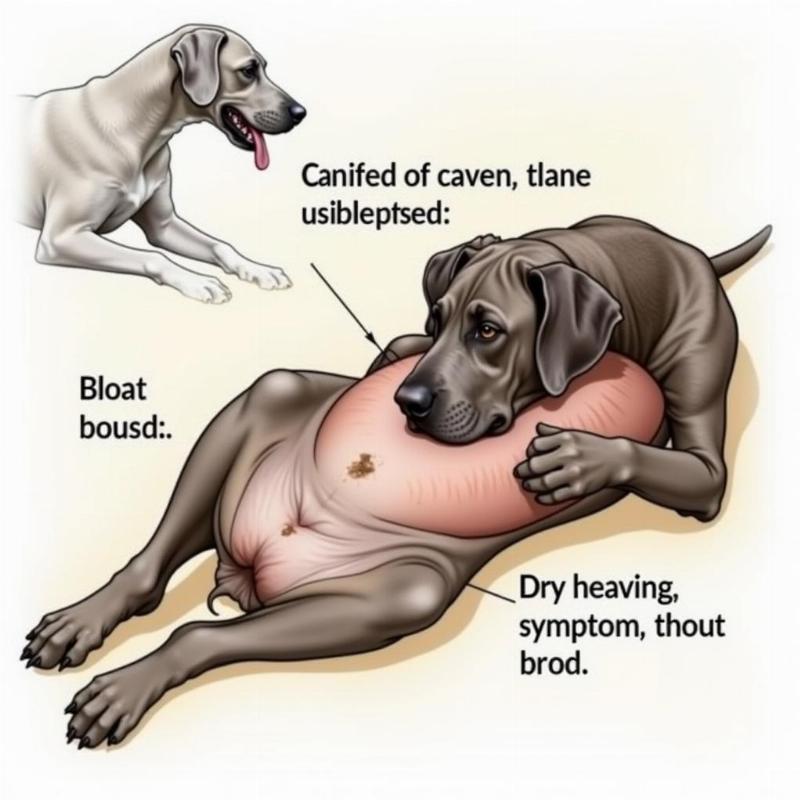Dry heaving in dogs, that unsettling sound of retching without vomiting, can be alarming for any pet owner. Understanding the potential dry heaves in dogs causes is crucial for providing appropriate care and addressing any underlying health issues. This article will explore the various reasons why your dog might be dry heaving, from relatively benign issues to more serious conditions requiring veterinary intervention.
Understanding Dry Heaving in Dogs
Dry heaving, also known as non-productive vomiting, is a forceful contraction of the abdominal and chest muscles, mimicking the act of vomiting but without producing any substance. It can be a symptom of various conditions, ranging from simple gastrointestinal upset to life-threatening emergencies. Recognizing the accompanying symptoms and understanding the potential dry heaves in dogs causes is essential for determining the severity and seeking appropriate veterinary care.
Common Causes of Dry Heaves in Dogs
Several factors can contribute to dry heaving in dogs. Some of the most common dry heaves in dogs causes include:
- Kennel Cough: This highly contagious respiratory infection is a frequent culprit behind dry heaving episodes. The inflammation in the airways can trigger a cough reflex, sometimes leading to retching and dry heaving.
- Gastrointestinal Upset: Just like humans, dogs can experience indigestion, acid reflux, or other digestive issues that can cause dry heaving. Eating something spoiled, swallowing foreign objects, or even a sudden change in diet can trigger these episodes.
- Blockages: Obstructions in the esophagus or stomach can prevent food or liquid from passing through, leading to dry heaving and other gastrointestinal distress. This can be a serious condition requiring immediate veterinary attention.
- Bloat: Gastric dilatation-volvulus (GDV), commonly known as bloat, is a life-threatening condition where the stomach twists, trapping gas and fluid. Dry heaving is a common symptom of bloat, along with a distended abdomen and restlessness.
 Dog dry heaving due to bloat
Dog dry heaving due to bloat
When to Seek Veterinary Care for Dry Heaving
While occasional dry heaving might not be a cause for immediate concern, certain situations warrant a prompt visit to the veterinarian. Seek immediate veterinary attention if your dog’s dry heaving is accompanied by:
- Distended abdomen: This could indicate bloat, a life-threatening emergency.
- Lethargy or weakness: Severe dehydration or underlying illness can cause these symptoms.
- Difficulty breathing: Respiratory issues like pneumonia or aspiration can be serious.
- Blood in vomit or stool: This signals a potential internal injury or illness.
- Persistent dry heaving: If the dry heaving continues for more than a few hours or recurs frequently, it’s essential to consult a veterinarian.
Preventing Dry Heaving in Dogs
While not all dry heaves in dogs causes are preventable, some measures can reduce the risk:
- Vaccinations: Keeping your dog up-to-date on vaccinations, including the kennel cough vaccine, can significantly reduce the risk of infectious respiratory diseases.
- Dietary Management: Feeding a balanced, high-quality diet and avoiding sudden changes in food can prevent gastrointestinal upset.
- Prevent Access to Foreign Objects: Ensure your dog doesn’t have access to toys, bones, or other objects they could swallow and cause blockages.
- Slow Eating: For dogs prone to gulping food, using slow-feeder bowls or puzzle toys can prevent them from swallowing large amounts of air, which can contribute to bloat.
Conclusion
Dry heaving in dogs can stem from various causes, some minor and others requiring urgent veterinary care. Understanding the potential dry heaves in dogs causes and recognizing accompanying symptoms is crucial for ensuring your furry friend receives the appropriate treatment. By being proactive and attentive to your dog’s health, you can help them live a happy and healthy life.
FAQ
- What is dry heaving in dogs? Dry heaving is the act of retching or attempting to vomit without producing any substance.
- Is dry heaving always serious? No, occasional dry heaving can be due to minor issues like indigestion. However, persistent or severe dry heaving can indicate a more serious problem.
- When should I take my dog to the vet for dry heaving? Seek immediate veterinary care if your dog’s dry heaving is accompanied by a distended abdomen, lethargy, difficulty breathing, blood in vomit or stool, or if it persists for more than a few hours.
- Can I prevent dry heaving in my dog? Some preventative measures include vaccinations, dietary management, preventing access to foreign objects, and using slow-feeder bowls.
- What are the most common causes of dry heaving? Kennel cough, gastrointestinal upset, blockages, and bloat are common causes of dry heaving in dogs.
- How is dry heaving diagnosed? A veterinarian will perform a physical exam and may recommend additional tests like blood work, X-rays, or ultrasound to determine the underlying cause.
- What is the treatment for dry heaving? Treatment depends on the underlying cause and can range from supportive care for minor issues to surgery for conditions like bloat.
Beautdogs.us is your premier destination for all things dog-related in the USA. We offer expert advice on dog breeds, care, and the latest product recommendations. Whether you’re a seasoned dog owner or just starting your journey with a furry friend, Beautdogs.us provides a trusted source of information to help you navigate the exciting world of dog ownership. Contact us today for all your dog-related inquiries! Email: [email protected], Phone: +1 501-555-7529.